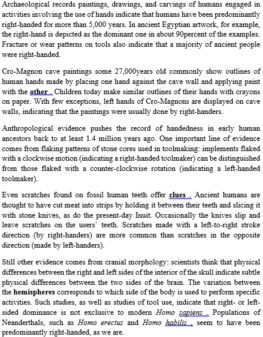Read the following passage and mark the letter A, B, C, or D on your answer sheet to indicate the correct answer to each of the questions from 28 to 34
FAMILY LIFE IN THE UNITED STATES
Family life in the United States is changing. Fifty or sixty years ago, the wife was called a “housewife”. She cleaned, cooked, and cared for the children. The husband earned the money for the family. He was usually out working all day. He came home tired in the evening, so he did not do much housework. And he did not see the children very much, except on weekends.
These days, however, more and more women work outside the home. They cannot stay with the children all day. They, too, come home tired in the evening. They do not want to spend the evening cooking dinner and cleaning up. They do not have time to clean the house and do the laundry. So who is going to do the housework now? Who is going to take care of the children?
Many families solve the problem of housework by sharing it. In these families, the husband and wife agree to do different jobs around the house, or they take turns doing each job. For example, the husband always cooks dinner and the wife always does the laundry. Or the wife cooks dinner on some nights and the husband cooks dinner on other nights.
Then there is the question of the children. In the past, many families got help with child care from grandparents. Now families usually do not live near their relatives. The grandparents are often too far away to help in a regular way. More often, parents have to pay for child care help. Ihe help may be a babysitter or a day-care center. The problem with this kind of help is the high cost. It is possible only for couples with jobs that pay well.
Parents may get another kind of help form the companies they work for. Many companies now let people with children work part-time. That way, parents can spend more time with their children. Some husbands may even stop working for a while to stay with the children. For these men there is a new word: they are called “househusbands”. In the USA more and more men are becoming househusbands every year.
These changes in the home mean changes in the family. Fathers can learn to understand their children better, and the children can get to know their fathers better. Husbands and wives may also find changes in their marriage. They, too, may have a better understanding of each other.
The changes in the American home mentioned in this passage may __________.
A. help families
B. not happen
C. cause problems for a marriage
D. not change the children at all




Đáp án A
Những thay đổi trong gia đình Mỹ được đề cập trong bài đọc có thể__________.
A. giúp đỡ các gia đình
B. không xảy ra
C. gây ra nhiều vấn đề cho cuộc hôn nhân
D. không làm thay đổi bọn trẻ chút nào
Đọc xuyên suốt cả bài đọc này, ta thấv rằng những thay đổi trong gia đình Mỹ đã giúp đỡ cho gia đình rất nhiều : các thành viên trong gia đình hiểu nhau hơn, vợ chồng hiểu nhau hơn....